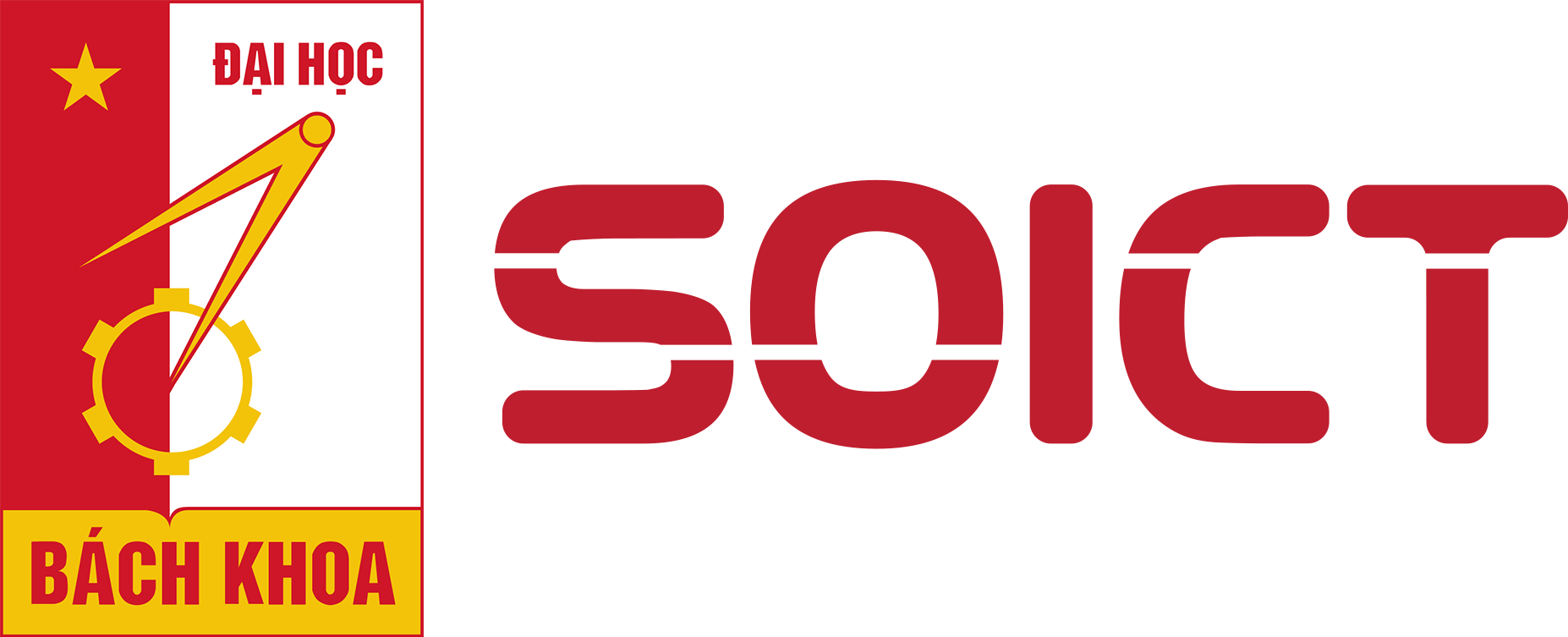
Name: Department of Computer Science
Head: Ph.D. Pham Dang Hai
Deputy Head: Assoc. Prof. Le Thanh Huong; Ph.D. Vu Thi Huong Giang
Address: Building B1, Hanoi University of Science and Technology
Tel.: +84 (0) 24 38696121
Email: cs@soict.hust.edu.vn
The Department of Computer Science was established on November 18, 2021 on the basis of the combination of 3 previous departments of the School of Information and Communication Technology (SoICT): the Department of Software Engineering, the Department of Computer Science and the Department of Information Systems. The Department of Computer Science not only undertakes the training of core subjects in the standard and high-quality training programs (Elitech) of the SoICT, but also performs the function of intensive training in Computer Science for the degrees of Bachelor, Engineer, Master and Doctorate.
With the mission of training high-quality human resources capable of participating in the process of creating knowledge and new products for the 4.0 technology revolution and the country’s digital transformation, the Department of Computer Science conducts the following training programs:
- Bachelor and Engineer degrees in Computer Science with application orientations: Software Engineering, Information Systems and Intelligent Data Analysis.
- Master of Science degree in Computer Science with research orientations on Software Engineering and Information Systems.
- Master of Engineering degree in Information Technology.
- PhD degree in Computer Science, Information Systems, Software Engineering
- The Department of Computer Science also participates in high-quality undergraduate and graduate training programs of the SoICT such as HEDSPI, Global ICT, Francophone, Cyber Security, Data Science and Artificial Intelligence.
The teaching staff of the Department are highly qualified and dedicated to the profession. Department members have published numerous scientific works in prestigious journals; participated in compiling and editing numerous textbooks, which are currently being used to teach at many IT schools in the country; chaired numerous scientific research projects at all levels; has won prestigious research and application awards, notably the Vietnamese Talent Award or the Golden Globe. The Department ‘s strong research fields include: Algorithms and optimization, Evolutionary computing, High-performance computing, Fuzzy logic and logical computation, Distributed systems, Machine learning, Computer vision, Data analysis, Data integration, Information search, Natural language processing, Software verification and validation, Project management and optimization, Intelligent software analysis technology, Software modeling, Database and data management and etc.
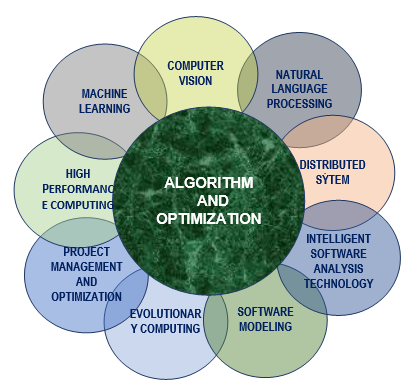
Figure 1. Main research directions of the Department of Computer Science
The Department has strong co-operations with well-known international universities and research centers such as: National Institute of Informatics of Japan, Nanyang Technological University (Singapore), Southern University of Science and Technology (China), University of Technology Sydney, University of Melbourne (Australia), Victoria University of Wellington (New Zealand), Grenoble Institute of Technology (France), US Army Research Center, University of Montreal (Canada). These co-operations are extended from various activities such as inviting and sending lecturers to participate in training programs, co-work in thesis defense committees, co-supervise PhD students, that helps to promote research cooperation and technology transfer.
The Department has contributed to the training of thousands of engineers in the fields of Information Technology, Software Engineering, Information Systems and Computer Science, of which many have become professors at universities, or held key roles at domestic IT companies or worked for well-known international technology corporations. The Department is also a place to incubate, nurture and is a start-up cradle for many unique and creative ideas. The number of startups and successful businesses in the IT field from the students and alumni of the Department increases every year.
2. Typical research results
Plagiarism detection system to support managing studying and research
The system has two functions:
- Detect a Vietnamese document being copied from other Vietnamese documents.
- Detect a Vietnamese document being copied from English documents.
Documents to be considered include assignment reports, undergraduate theses, master theses, doctoral theses, articles in English and Vietnamese from universities and research institutes and other types of materials accessible on the Internet. The system has been integrated into the system of teaching management, projects and online services of Hanoi University of Science and Technology.
Contact information: Assoc. Prof. Le Thanh Huong (huonglt@soict.hust.edu.vn)
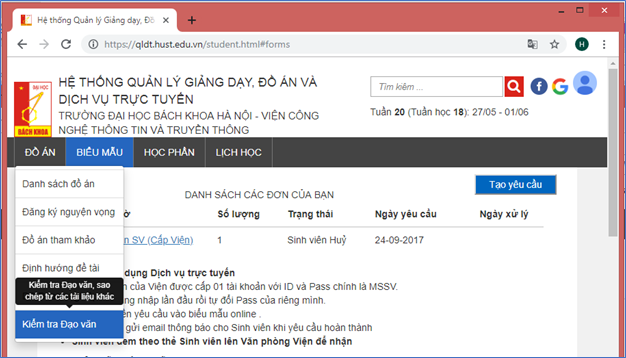
Fig 2. The plagiarism detection system
OpenCBLV Framework
OpenCBLS is an open source framework (based on the standard constraint-based local search architecture) which allows developers to model and solve some combinatorial optimization problems in the domain of operation management by the local search approach.
On the one hand, users can use OpenCBLS as a black-box by modeling the problem using built-in OpenCBLS API and the engine of OpenCBLS will find the solutions by different local search heuristics. On the other hand, users can also design and build their own components (depending on specific requirements of the problem at hand) implementing the defined interface and integrate them into the system. OpenCBLS has been used for education, research and development of real-world applications. Users can find the source of the OpenCBLS framework at https://github.com/dungkhmt/OpenCBLS
Contact: Pham Quang Dung (dungpg@soict.hust.edu.vn)
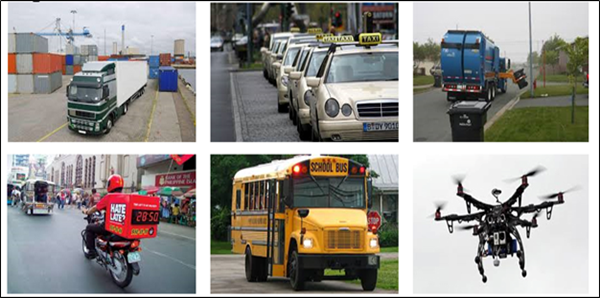
Figure 3. Vehicle routing solutions in transportation and logistics
Platform giasan.vn
giasan.vn is an online real estate data analytics platform. Leveraging big data and artificial intelligence technologies, giasan.vn provides homebuyers and brokers with the most direct and detailed information about the Vietnamese real estate market. The platform has been collecting massive amounts of data from public real-estate listing sources. The data then flow through a pipeline of data cleaning, data mining and natural language processing to extract valuable insights. giasan.vn provides the following functionalities:
- Historical pricing data reports
- AI-based property appraisals
- AI-based market trend predictions
- AI-based homebuyers and brokers matching
- Real-estate chatbot
giasan.vn was awarded the 3rd Vietnamese Talent Award in 2017 and was sold to a real-estate brokerage firm in 2018.
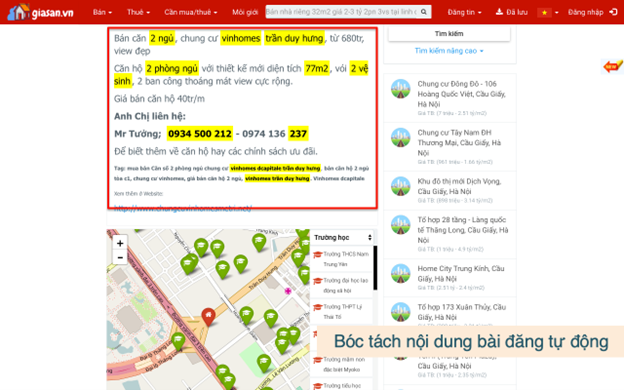

Contact the development team: Tran Viet Trung (trungtv@soict.hust.edu.vn)
Evolutionary multitask transfer optimization
Nowday, people increasingly tend to manage and perform many tasks simultaneously with different complexity. When faced with new problems, people rarely solve them from scratch but often use knowledge from similar issues or past experiences to solve new situations quickly and effectively. Inspired by this, evolutionary multitask transfer optimization has emerged as an effective method for solving various optimization problems concurrently and making efficient use of similar knowledge among them.
Our team focuses on studying evolutionary multitask transfer algorithms with effective parameter adaptation of knowledge transfer between tasks and allocating resources for each task appropriately. Besides, the similarity measures among tasks to adjust the information transfer process will also be carefully considered.
The effectiveness of the proposed multitasking evolutionary methods will be experimented on combinatorial optimization problems on graphs. Solving these optimization problems plays a vital role since there are many practical applications that have been modeled as combinatorial optimization problems on graphs, such as scheduling and planning problems, logistics and transportation problems, network design problems, and other application areas of artificial intelligence.
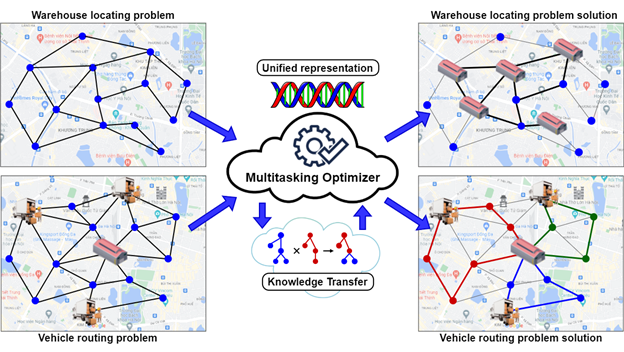
Awards
- The first prize in Competition on Evolutionary Multi-task Optimization, Multi-task single-objective optimization at IEEE Congress on Evolutionary Computation (CEC) 2021.
- The Second prize in Competition on Evolutionary Multi-task Optimization, Multi-task single-objective optimization at IEEE World Congress on Computational Intelligence (WCCI) 2020.
- The first prize in Competition on Evolutionary Multi-task Optimization, Multi-task single-objective optimization at IEEE World Congress on Computational Intelligence (WCCI) 2018.
Publications
The research results have been published at top tier conferences and journals such as: GECCO, WCCI, Information Sciences, Knowledge-Based Systems, Memetic Computing, Applied Soft Computing…
Contact: Assoc. Prof.. Huynh Thị Thanh Binh (binhht@soict.hust.edu.vn)
V-Chain.vn
V-Chain provides solutions for businesses, organizations, and governments that have requirements of applying blockchain technology to their existing applications. The services provided by V-Chain towards a B2B business model. End users will benefit from transparency, immutable data, and reduced intermediaries in the use of blockchain technology when applying V-Chain.
Contact the development team: Assoc. Prof. Nguyen Binh Minh (minhnb@soict.hust.edu.vn)
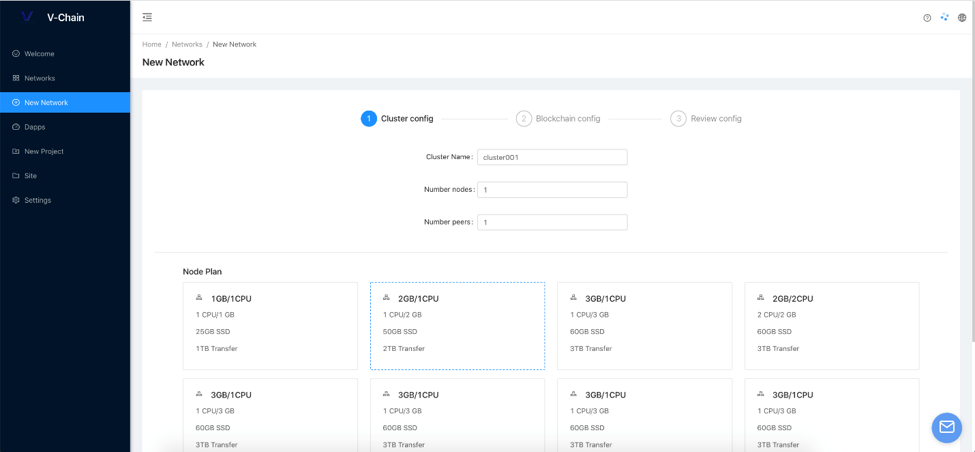
Applications of unmanned aerial vehicle in transportation
The continuous technological advances over the past decade have led to an increasing use of unmanned aerial vehicles (commonly known as drones or UAV) in many areas of life such as logistics, military operations, public security, traffic surveillance, and monitoring. Amazon is testing a “Amazon Prime Air” service that uses drones to deliver packages of up to 5 pounds to customers in 30 minutes. Walmart, DHL, and UPS are also testing the use of drones in their services.
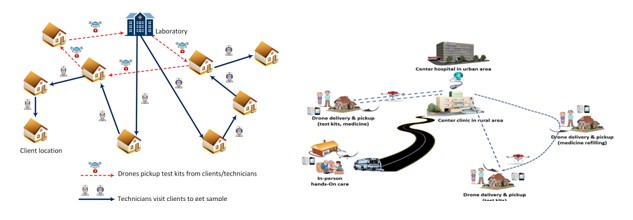
This research focuses on integrating drones into existing transportation service systems such as postal services, healthcare services, disaster and epidemic relief, with the goal of improving service quality, reducing operating cost, operating time, CO2 emission, etc.
Contact: Nguyen Khanh Phuong (phuongnk@soict.hust.edu.vn)
